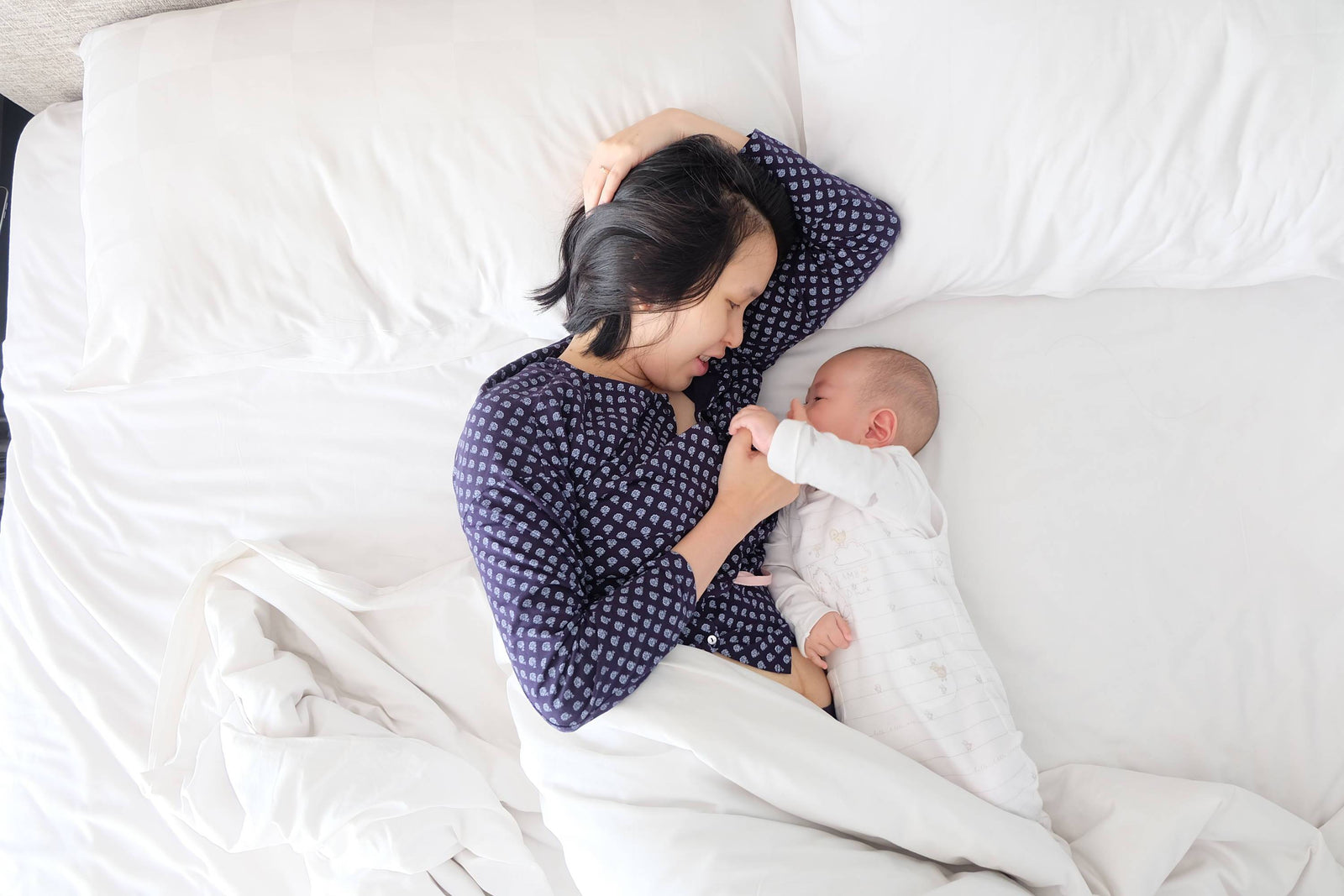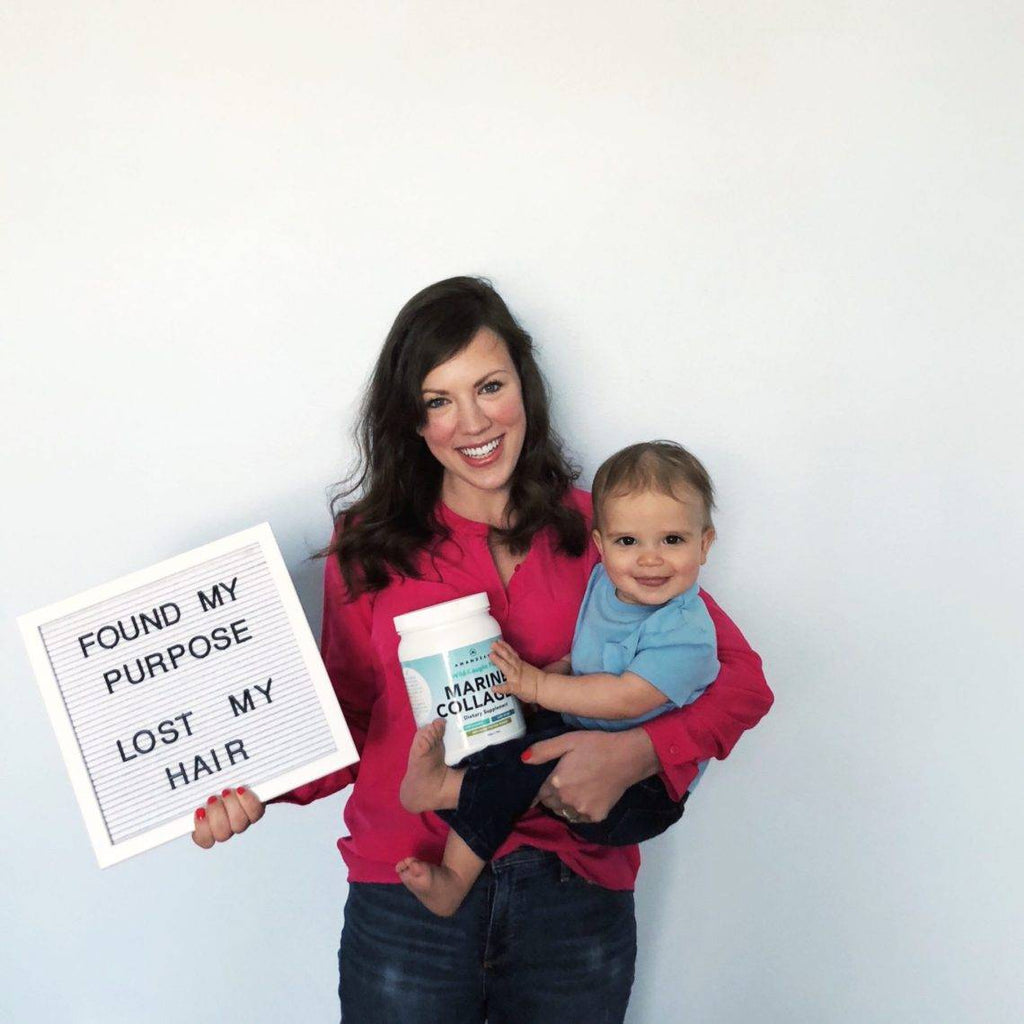Your Cart is Empty

April 19, 2019 7 min read
There are a lot of amazing things about becoming a mother. As a mother myself, I can tell you it’s the most beautiful thing you will experience in life, yet also the hardest at the same time.
Being a mom is miraculous and filled with joy but it can be offset with conditions such as postpartum hair loss, postpartum depression, dramatic sleep deprivation, and relationship stress. All are well-documented and recognized symptoms that take place after birth.
Fortunately, postpartum hair loss is a manageable and usually temporary condition as compared to sleep deprivation for example. However, hair loss can have psychological effects on a woman’s mood and drastically affect her self-esteem. Let’s take a closer look at this topic and where it all starts, what mechanisms contribute to it, and most importantly how it can be managed and minimized in an all-natural way.

It is always a good idea to understand what a healthy hair follicle cycle looks like in order to grasp what an abnormal one would be. A healthy hair follicle passes through three consecutive stages in each cycle, which include proliferation (anagen), involution (catagen), and resting (telogen).
A healthy anagen phase takes from two to six years and interestingly not only is the hair shaft growing, but also most epithelial hair follicle compartments undergo proliferation as well. The highest proliferative activity is experienced by the hair matrix keratinocytes.
During the catagen phase, the hair follicle enters a process of programmed cell death with an upward movement of the follicle, followed by a telogen phase that lasts approximately 100 days, where shedding of the hair takes place and new hair grows on in the anagen phase (1).
In fact, hair follicles follow a random mosaic pattern of growth where each follicle has its own rhythm, uninfluenced by the follicles immediately surrounding it. (2). However, On average, the total number of new hair formations compensates for the amount of hair that is shed, so the total number of hair covering the scalp remains consistent.
With a range of 75 000 to 150 000 hairs on the head, the reported average daily telogen hair shedding varies from under 50 to over 100 in a healthy individual.
Clinically, postpartum hair loss is classified as a subgroup of the telogen effluvium hair loss,and more specifically considered an acute type of telogen effluviumwhich means a new mother is losing < 50 % of scalp hair that takes a place around 3 months after postpartum. A study by Kligman reported that scalp hair loss may be up to 400 hairs daily during the postpartum period. (3).
You might be surprised to know that postpartum hair loss is a normal physiological response to hormonal alterations, however, it can be an extremely frightening experience! No one enjoys seeing their hair fall out! In contrast to pregnancy, where a combination of hormonal changes can increase the number of hair follicles and promote thicker, shinier hair, the removal of the placenta at birth causes levels of progesterone and estrogens to return to normal within 2-4 days and more hair is shed. Scientifically speaking, during pregnancy the thyroid hormone, secondary androgen, and estrogens hormones can cause hair follicles to remain in the anagen phase allowing for more hair to grow, whereas after a women has given birth a higher number of hair follicles enter the telogen phase leading to a higher than usual number of hairs being shed.

As a side note, a healthy hair cycle follows a seasonal pattern in growing and shedding, and it’s reported that even in healthy women who don’t suffer any type of hair loss, the maximum proportion of telogen hairs takes place in April and July. So, for those whose postpartum hair loss coincides with these months it is often the case that their condition is made more severe. Added to the percentage of hair loss due to postpartum, there is also the impact of a normal hair cycle reaching a maximum state of shedding.
However, if the pattern of hair loss was extensive and accompanied by other unusual symptoms like shortness of breath or altered physical endurance, it would be wise to refer to your doctor to rule out any suspicion of thyroid disturbance or iron deficiency.
It’s noteworthy that most women who experience postpartum hair loss will recover from it within six to twelve months depending on the severity of hair loss. However, psychologically, women may feel more compromised with the addition of motherhood duties and the role these take away from their personal time and beauty regime. Hair loss on top of these changes doesn’t help. So, let’s explore what can be done to manage and overcome postpartum hair loss. Keep reading!
This might sound like an oversimplified solution but it might also be a convenient way to overcome the lack of time for hair care in the first place. Furthermore, professional hair stylists boast that shorter hair often gives the illusion of thicker hair for most women.
Eat a balanced dietthat is high in protein. Protein is important because hair is made primarily from keratin protein, and optimizing protein intake will by default ensure an effective supply of amino acids for new hair to be formed.
Take an all-natural marine collagen powderas a daily supplement. An unflavored, sugar-free collagen supplement is an easy-to-use and safe source of amino acids while breastfeeding. Taking a high bioavailability form of collagen sourced from fish means that the collagen will be more easily absorbed into the small intestine, providing the blood with a healthy supply of amino acids in order to effectively produce new keratin protein for hair growth. Insofar as supplements go, Marine Collagen might be one of the best for new mothers managing hair loss.

Collagen can also serve to shift the hair growth cycle and to strengthen blood vessels so that they can effectively deliver required nutrients to the areas of the body that need them most and speed the recovery of the hair follicle (4). In addition, given that the hair shaft is composed almost entirely of protein, fat-free Fish Collagen Peptides are a rich source of amino acids and would be perfect for the production of normal healthy hair.
Most breastfeeding moms are somewhat cautious about supplementation of any kind due to the fact that everything a mom consumes will reach her baby through milk. But you find it interesting to know that the Journal of Pregnancy and Child Health published a Cohort study on supplementing hydrolyzed collagen protein to pregnant and postpartum women and demonstrated that in addition to being totally safe and well tolerated when taken during pregnancy and postpartum, collagen supplement was able to demonstrate improved quality of life and wound healing rates and 100% improvement in the protein levels for women who took it (5).
However, to be on the safe side, choose a collagen brand that contains all-natural Non-GMO ingredients, sourced 100% from wild-caught fish, and is cGMP certified. Talk to fellow friends and mothers about which brand they trust and always read reviews. As with any health or nutrition-related decision, it's important to consult your healthcare professional before integrating something new into your diet.
-Shelley @Letsliveandlearn
Read Shelley's Full Story Here

A Vitamin B complex and L-cysteine supplementhas been demonstrated to exert positive effects on hair loss via the hair pluck test. These nutrients exert a positive effect on hair swelling as a criterion for hair quality, and on hair's tensile strength (mechanical property that measures the maximum limit before tissue deformation takes place and to what extent certain material prevent mechanical failure) of the hair fiber (6).
Although postpartum hair loss is a common condition for many women, it is estimated that between 40 to 50 % of women suffer from acute telogen effluvium according to statistics from the American Pregnancy Association, it is not easy to accept for many. For this reason, the above tips will arm you with a number of ways to manage this condition in a more positive way and help to minimize its severity.
In conclusion, here’s a small story I’d like to share with all of you. When my mother gave birth to me over 25 years ago, she also suffered from postpartum hair loss and at the time little could be done to manage the condition. Today, she assures me how lucky we are to have easy and accessible access to the information and products that can help. Today she takes Marine Collagen from Wild-Caught Cod for managing her arthritis and she is continually satisfied by its positive impact on her mobility. The point is if you’re reading this and feel as if nothing can be done to improve your condition, today we have many healthy options that can provide alleviation and prevent hair loss from becoming more severe.
To read more on this topic, read Let’s Live & Learn’s first-hand account of how Amandean’s Non-GMO Wild Caught Marine Collagen helped her to recover from postpartum hair loss.
Check out our unflavored, sustainably-sourced Marine Collagen in our online store.
Take our quiz and find which supplements your body is craving.


April 24, 2024 8 min read

April 17, 2024 4 min read

April 01, 2024 7 min read